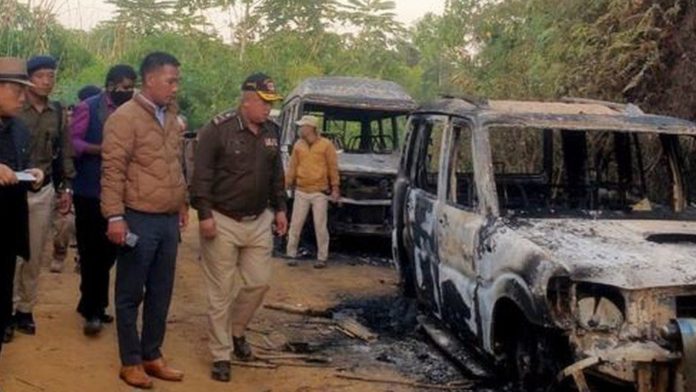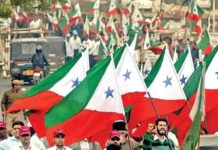At least 15 civilians and one soldier were killed in a botched ambush and retaliatory violence in Nagaland’s Mon district on 4 December, prompting the State government and the Army to order a probe into the incident. A special unit of the Army had mistakenly opened fire at a pick-up van carrying coal miners from the Tiru area to their village Oting about 15 km away, killing six on board.
Some of the civilians died when villagers, alarmed by the gunfire and death of their brethren, clashed with the troops. At least two vehicles of the Army Special unit were set on fire.
Following the incident, protests erupted across Nagaland on 5 December with a mob of about 500 men attacking and vandalising a camp of the paramilitary Assam Rifles in district headquarters Mon. At least two persons were killed during the attack.
Soon after the violence in Mon, Section 144 of the CrPC was imposed in the district to prevent gatherings and restricting the movement of vehicles.
Official Version
The official version is that, based on intelligence inputs about the movement of insurgents, the Army laid an ambush. An approaching vehicle was signalled to stop but it tried to flee, which aroused suspicion. The Army personnel thereupon opened fire, which resulted in the death of eight persons. The villagers, thereafter, reportedly surrounded the Army unit and attacked them with daos and firearms. The forces again opened fire — this time in self-defence — killing six more civilians. Army personnel also suffered injuries.
The key Naga group negotiating with the Centre, NSCN(I-M), has declared it a “black day” for all Nagas and termed the incident “unprecedented in recent history”, while the Naga National Political Group (NNPG) has blamed the continued implementation of the Armed Forces Special Powers Act (AFSPA), 1958 for such incidents.
Armed Forces Special Powers Act
After the Mon incident, there was renewed clamour for the repeal of the draconian Armed Forces Special Powers Act (AFSPA), which has been in force in the state since 1958. Large-scale protests and even a 16-year-long hunger strike by Irom Chanu Sharmila in Manipur for the repeal of the law have not moved the governments over the past several decades.
Counterinsurgency operations are full of uncertainties. Intelligence may be right, it may be false. Sometimes you walk into a trap. It is not easy to distinguish friend from foe. To fire or not to fire is always a difficult decision. A split second makes all the difference. In such a situation, mistakes and even blunders happen. It need hardly be said that the US generally takes no action in such cases which are dismissed as “collateral damage”. We have much better institutional arrangements for such lapses.
Government has already, during the last few years, been gradually withdrawing AFSPA from different areas. The Act was withdrawn from Tripura in 2015 and Meghalaya in 2018 while in Arunachal Pradesh it is now restricted to the three districts of Tirap, Changlang and Longding. The whole of Assam, Nagaland and Manipur (except the Imphal municipal area), however, continue to be under AFSPA. The Jeevan Reddy Commission had, in 2005, recommended the repeal of the Act. The matter could be examined again in consultation with all stakeholders and a well-considered decision taken, keeping in view the requirements of national security.
Peace Talks
The NNPG, which comprises seven insurgent groups that have so far supported the peace talks process, rescinding many of its earlier demands such as separate flag, said in a statement that the actions of the military have “belittled the commitments made by the Indian Prime Minister and Home Minister”. It said, “The draconian laws in Nagaland and military atrocities over many decades have made Naga people very aware that they are not and will never be Indians.”
The killings could be exploited by certain insurgent groups to recruit and even strengthen the hands of the NSCN(I-M), which will likely push for its demands with greater vigour given that the government is on the back foot. Even groups seen being in favour of signing the deal quickly will have to reflect the public anger to remain relevant, sources said.
The Framework Agreement (FA) itself is turning out to be the biggest roadblock before a final deal. Government officials say the wordings are so vague that both sides have interpreted them according to their own convenience.
The NSCN(I-M) has argued that the FA is clear that India and Nagaland would share “sovereign power” and coexist as “two entities”. This, it has argued, is affirmation that India accepts the desire of Naga people for sovereignty and staying within India as a separate entity. It has said this simply means India had agreed to a separate flag and constitution for Nagaland. The Centre has said there is no question of granting sovereignty to a state within India and so both the flag and the constitution are out of the question.
Way Ahead
Not many people in the country know that the rebel Nagas have gone back on every agreement that the Government of India negotiated with them in the past. The Naga People’s Convention held in 1957 demanded that the Naga Hills district of Assam and the Tuensang Frontier Division of North-East Frontier Agency (NEFA) be merged into a single unit. The demand was conceded and the Naga Hills Tuensang Area (NHTA) was formed. Another Naga People’s Convention, held in 1959, demanded the creation of a separate state of Nagaland. This was also conceded and Nagaland was carved out in 1963. Then there was the Shillong Agreement in 1975 whereby the underground groups agreed to deposit their arms while the government agreed to release the rebels held in detention and give liberal grants for their rehabilitation. The hardcore elements, however, did not abide by the terms of the agreement.
The Centre would have to assuage public anger arising out of the mistaken killings through an impartial and quick probe, followed by action on those responsible. Only after the government can convince people that it means well, despite the killings, can the Centre can resume discussions.


















